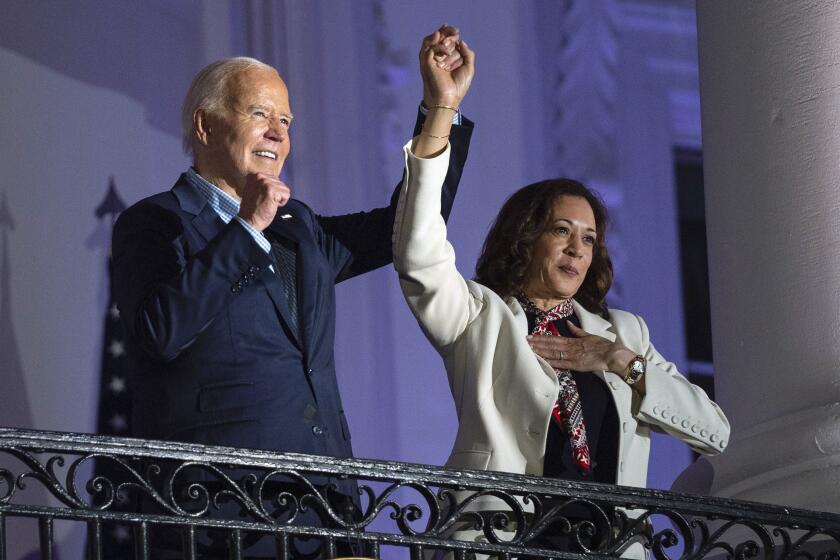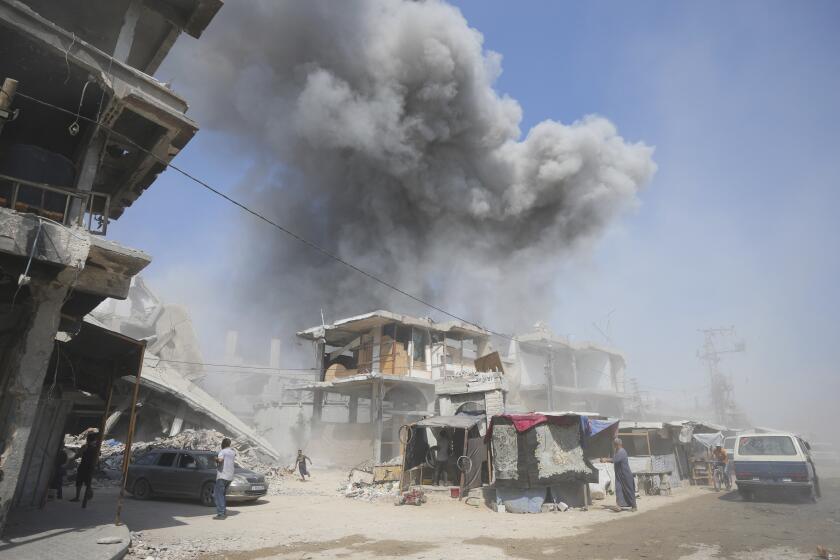Sisi’s crushing presidential election in Egypt undercut by turnout
Victory celebrations erupted Thursday among backers of Abdel Fattah Sisi, who won election as Egypt’s next president by a massive margin, according to tallies reported by official media and released by his campaign.
But the landslide win -- with Sisi garnering about 93% of the vote, according to an unofficial count cited by state outlets -- was soured by a turnout lower than his camp had hoped for, pointing to a wellspring of anger, mistrust or apathy among a large chunk of the electorate.
Moreover, Sisi’s strongman image took a battering by the seemingly desperate measures the government took to badger voters into casting a ballot -- keeping the polls open an extra day, declaring an impromptu national holiday, threatening substantial fines for those who stayed away and providing free transport to voters’ home districts. As many polling stations stood nearly empty, pro-military talk-show hosts unleashed a torrent of invective at “traitors” who failed to vote.
The unofficial turnout figure, which election officials said rose to 47.3% after the added-on voting day, prompted skepticism in some quarters. Sisi’s lone opponent, Hamdeen Sabahi, withdrew his polling monitors on the last day of voting to protest the extension, and said that without them in place, the results, including the turnout figures, were suspect.
The U.S.-based Observer Democracy International said the government’s last-minute move to keep the polls open for an unscheduled additional day raised questions about the integrity of the electoral process. However, European Union monitors said the vote itself appeared to have been conducted in line with the law, although it cited undemocratic practices in the months leading up to the balloting.
To a major extent, Sisi was a victim of inflated expectations put forth by his own camp. The turnout as reported would be respectable by standards of most Western countries, but was far short of the 80% Sisi himself said he wanted.
The balloting resulted in a greater number of votes than were cast for now-ousted Islamist president Mohamed Morsi in 2012, but the preliminary turnout did not equal or exceed the 52% of the voters who took part in the runoff balloting that brought Morsi and his Muslim Brotherhood to power.
The apparent failure to hit that target carries a heavy symbolic resonance for Sisi and his backers, because the election followed a months-long buildup in which he was depicted as a universally beloved leader, destined by fate to lead Egypt out of three years of nonstop turmoil.
More important, the vote was meant to remove the taint of having ousted Morsi by force last July and to give a stamp of public approval to the repressive measures Sisi and the interim government have since employed to try to crush the Brotherhood. The Sisi camp had hoped to silence critics at home and abroad who maintain that after engineering the coup in the wake of huge anti-Morsi protests, he should not have been the one put forward to lead a civilian government as part of a promised democratic transition.
Sisi’s decision not to wage what he called a “traditional” campaign -- he made no public appearances and did not hold any debates with Sabahi -- struck some voters as out of touch and arrogant. During the weeks of electioneering, Sisi opted instead for a series of television interviews with friendly interlocutors, and closed-door appearances before carefully vetted audiences who were more like focus groups.
The preliminary election results were bruising for Sabahi -- he had fully expected to lose, but votes for him were outnumbered by invalid ballots, many deliberately spoiled by voters in protest -- placing him third in a two-man race.
At polling places, Sisi’s supporters made themselves highly visible, dancing and shouting slogans supporting him, but even before the vote, it was apparent that his backing was narrower than fervent displays of devotion suggested.
Days before the polling, the Pew Research Center released a survey that found just 54% viewed the candidate favorably, compared with 45% who did not, and that four in 10 Egyptians still held favorable views of the Brotherhood, even amid the vitriolic outpouring against the movement in state media.
In the hours after the polls closed and the preliminary tallies pointed to a resounding win, Sisi supporters staged triumphal all-night gatherings, honking car horns, waving flags and setting off fireworks. One of the celebration venues was downtown Cairo’s Tahrir Square, the epicenter of the 2011 revolution that swept away dictator Hosni Mubarak.
“This result wasn’t what we fought for in those days,” said Nada Fouad, 29, who spent days and nights protesting in the square more than three years ago, and cheered what she thought was the start of a new order. “Our revolution still has a very long way to go.”
Hassan is a special correspondent.
More to Read
Sign up for Essential California
The most important California stories and recommendations in your inbox every morning.
You may occasionally receive promotional content from the Los Angeles Times.






